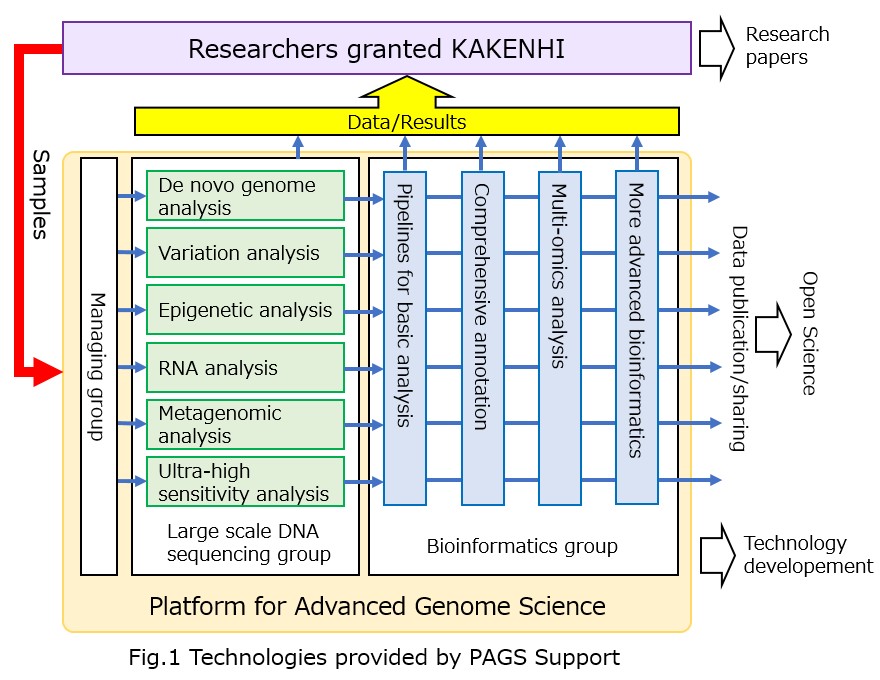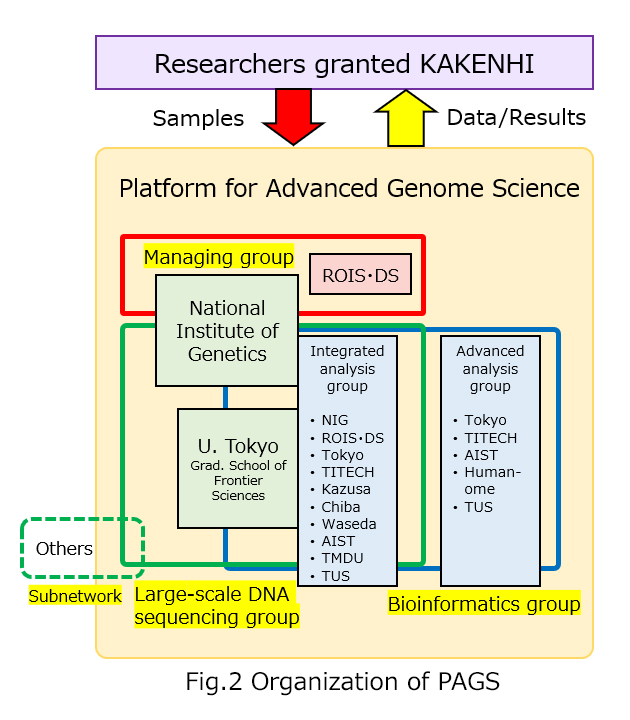About Us
About PAGS and PAGS Support
With the development of genomics, genome analysis technologies have become indispensable not only in the field of life sciences but also in many other fields. For further development, it is essential to develop and share large-scale, state-of-the-art analysis systems for both experimental and bioinformatics analysis. “Platform for Advanced Genome Science” (PAGS) was established for this purpose as a project of Grant-in-Aid for Scientific Research (KAKENHI) on Transformative Research Areas ― Platforms for Advanced Technologies and Research Resources supported by the Ministry of Education, Culture, Sports, Science and Technology. Beginning in April 2022, a period of six years is scheduled.
The PAGS members are experts in genomics and bioinformatics, who develop state-of-the-art technologies using the latest devices and provide the technologies to a wide range of projects that are selected from KAKENHI projects to solve their difficult issues. We call this activity “PAGS Support”. The costs of this activity are essentially covered by PAGS budget, therefore, the PAGS Support is not a funding program nor an analysis service but a kind of collaboration between KAKENHI projects and the PAGS members. The PAGS members try to develop technologies to solve difficult issues presented by KAKENHI projects, which leads to the emergence of more difficult issues, which leads to further improvement or development of technologies by the PAGS members. Such a virtuous circle should lead to the advancement of genome science and the peak creation of life science. These are the mission of PAGS Support.
Technologies provides by PAGS Support
As shown in Fig.1, the PAGS Support is consisted of three major activities; (1) Management and ELSI, (2) Large-scale DNA sequencing, and (3) Bioinformatic analysis. The latter two activities have the following categories of technologies and analysis, which are provided to the selected KAKENHI projects as warp weft.
(2) Large-scale DNA sequencing activities
B) Variation analysis
C) Epigenetic analysis
D) RNA analysis
E) Metagenome, environmental genome and hologenome analysis
F) Ultra-high sensitivity analysis
(3) Bioinformatics activities
The Bioinformatic Group consists of two groups, the Integrated analysis group and the rest the Advanced analysis group, both of which will share the following technology-specific support items in cooperation with (2) above.
B) Comprehensive annotation
C) Multi-omics analysis
D) More advanced bioinformatics

Organization of PAGS
PAGS is consisted of 30 researchers; 1 Principal Investigator, 20 Co-Investigators and 9 Research Collaborators, from 13 institutions (University Departments and Research Institutes) throughout the country. To promote the support activities, a network of institutions is formed with the National Institute of Genetics as the core institution (Fig.2). These institutions will share in the PAGS Support and its advancement through supporting the activities of the PAGS members.

Members of PAGS
(:Principal Investigator, :Co-Investigator, —:Research Collaborator)
(1) Management and ELSI Group
| Ken Kurokawa | Department of Informatics, National Institute of Genetics | |
| — | Yuji Kohara | Advanced Genomics Center, National Institute of Genetics |
| — | Sumio Sugano | Future Medicine Education and Research Organization at Chiba University |
| — | Toshihisa Takagi | Toyama University of International Studies |
| Minae Kawashima | Department of NBDC Program, Japan Science and Technology Agency |
(2) Large-Scale DNA Sequencing Group
| ·NIG Site | ||
| Atsushi Toyoda | Department of Genomics and Evolutionary Biology, National Institute of Genetics | |
| — | Hidehiro Toh | Advanced Genomics Center, National Institute of Genetics |
| — | Yasuhiro Gotoh | Advanced Genomics Center, National Institute of Genetics |
| ·UT Kashiwa Site | ||
| Yutaka Suzuki | Graduate School of Frontier Sciences, The University of Tokyo | |
(3) Bioinformatics Group
| ·Integrated analysis Group | ||
| [NIG Site] | ||
| Ken Kurokawa | Department of Informatics, National Institute of Genetics | |
| — | Koichi Higashi | Department of Informatics, National Institute of Genetics |
| Yasukazu Nakamura | Department of Informatics, National Institute of Genetics | |
| — | Yasuhiro Tanizawa | Department of Informatics, National Institute of Genetics |
| Hiroshi Mori | Department of Informatics, National Institute of Genetics | |
| — | Osamu Ogasawara | Bioinformation and DDBJ Center, National Institute of Genetics |
| Hideki Noguchi | Joint Support-Center for Data Science Research, Research Organization of Information and Systems | |
| Takehiko Itoh | School of Life Science and Technology, Tokyo Institute of Technology | |
| Hiroki Takahashi | Medical Mycology Research Center, Chiba University | |
| Michiaki Hamada | Faculty of Science and Engineering, Waseda University | |
| Hideki Hirakawa | Kazusa DNA Research Institute | |
| [UT Site] | ||
| Akihiro Nakaya | Graduate School of Frontier Sciences, The University of Tokyo | |
| Shinichi Morishita | Graduate School of Frontier Sciences, The University of Tokyo | |
| Frith Martin | Graduate School of Frontier Sciences, The University of Tokyo | |
| Masahiro Kasahara | Graduate School of Frontier Sciences, The University of Tokyo | |
| Yuki Nishimura | Graduate School of Frontier Sciences, The University of Tokyo | |
| Hiroshi Haeno | Research Institute for Biomedical Sciences, Tokyo University of Science | |
| Teppei Shimamura | Medical Research Institute, Tokyo Medical and Dental University | |
| Yutaro Kumagai | National Institute of Advanced Industrial Science and Technology | |
| ·Advanced analysis group | ||
| Kiyoshi Asai | Graduate School of Frontier Sciences, The University of Tokyo | |
| Shinichi Morishita | Graduate School of Frontier Sciences, The University of Tokyo | |
| Frith Martin | Graduate School of Frontier Sciences, The University of Tokyo | |
| Masahiro Kasahara | Graduate School of Frontier Sciences, The University of Tokyo | |
| Yuki Nishimura | Graduate School of Frontier Sciences, The University of Tokyo | |
| Hiroshi Haeno | Research Institute for Biomedical Sciences, Tokyo University of Science | |
| Takehiko Itoh | School of Life Science and Technology, Tokyo Institute of Technology | |
| Takuji Yamada | School of Life Science and Technology, Tokyo Institute of Technology | |
| Yutaro Kumagai | National Institute of Advanced Industrial Science and Technology | |
| Jun Sese | Humanome Lab., Inc. | |
